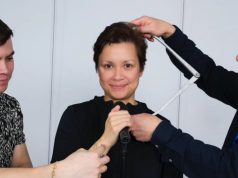Seven years ago, the Philippines surpassed global frontrunner India in business process outsourcing. Casual observers say call centers here are more exposed to the English language than in India.
Besides training customer service representatives on etiquette and techniques, many call centers require their employees to adopt American accents in place of their local accents while speaking in English.
But not all customers are happy with the results. Tony award-winning singer and actress Lea Salonga recently schooled call center representatives on social media on how important enunciation is than having an accent.
“Dear call center phone reps leaving messages for your customers, please enunciate! One such rep left a message that I could not, for the life of me, understand. Words were chewed up and garbled. Clarity is everything. Thank you,” she said on both her Facebook and Twitter accounts.
One call center representative, however, did not meet the good side of Salonga.
A Twitter user asked Salonga if the representative she was referring to was a Filipino or an Indian, noting that many agents with clarity problems apparently came from India.
“Was definitely not Indian, hence, Pinoy. More specifically, Pinoy trying to sound American. #HuwagPo #ParangAwaMoNa,” the Kapamilya star replied.
Her response opened the discussion among social media users if sounding like an American matters more than producing intelligible calls over the phone.
Many agreed, even those who are working in the call center industry, who admitted the flaws of many customer service representatives in the industry.
I am working in BPO, to be honest, may mga times talaga na hindi maintindihan kahit sa recording ang agents. That’s why we have QAs/QEs that randomly listen and monitor calls. We appreciate this feedback though.
— Gee Arr (@gee_arr29) April 19, 2018
I work as a Communication Skills/Product Trainer for a BPO company that caters to North American customers. I couldn’t agree more how Enunciation (and not Accent) makes or breaks a phone conversation.
— Sarah Marie Ponce (@sarahheika) April 18, 2018
There are those who admitted that having an American accent is required in their jobs. They also point, however, to a possibly bigger issue beyond accents and enunciation.
we’re trying to sound american because sometimes american will drop the call if they knew that they’re not talking to a native speaker.
— Ehli ❎❎ (@ItsMeBarryE) April 18, 2018
American accent, a need or not?
One Twitter user pointed out that the problem of unintelligible English does not only apply to Filipinos trying to have an American accent.
“There are also Americans who [don’t] speak clearly in English at times. Not because of accent but they really don’t enunciate the words clearly,” Eloisa Natividad said in her reply to Salonga’s Twitter post.
This accent problem also occurs in call centers based in the United States employing offshore agents.
BPO consulting firm ICMI cited a study that found found that call centers based in the United States have more satisfied customers than offshore companies.
“An offshore call center may be financially beneficial to a company, but if their customers feel that they cannot clearly understand, or connect, with an agent, their overall satisfaction may falter,” the ICMI article says.
Bottom line: We can’t blame the customer reps
The problem may also lies on the notion of some Filipinos that it is better to sound like an American than being understood.
You may sound like native in the future but it taaaaaakes so much practice. Doesn’t happen overnight. For now, ENUNCIATE. ?
— TagaCallCenter™ (@TagaCallCenter) April 18, 2018
There is also a sentiment that more training is needed to go beyond just having that Californian twang.
“They can’t actually afford private tutors so they maybe sound OA, boring to talk with over the phone. Customers just call them to have their assistance. Anyways, thanks for the feedback Ms. Lea,” Yang Sajin said.










